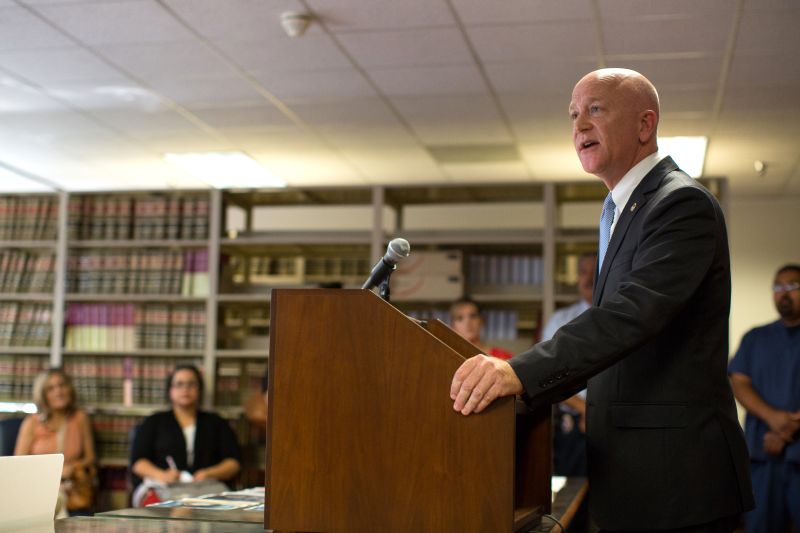Judge orders books removed from Texas public libraries due to LGBTQ and racial content must be returned within 24 hours

According to a Thursday order, a federal judge in Texas ordered that 12 books taken from public libraries by Llano County officials must be returned to shelves within 24 hours. Many of these books were removed because they contained LGBTQ or racial material.
In April 2022 seven residents sued county officials. They claimed their First Amendment and 14th Amendment rights were violated by books that were deemed inappropriate or restricted access to public libraries.
In a lawsuit, the US District Court for the Western District of Texas in San Antonio alleged that county officials had removed books from the shelves of the three-branch library system “because of the ideas within them” as well as revoked access to thousands of digital books since they couldn’t ban two titles.
Isabel Wilkerson’s “Caste: The Origins and Discontents” and “They Called Themselves The K.K.K.” were among the books returned to shelves. : The Birth of an American Terrorist Group by Susan Campbell Bartoletti, and “Being Jazz”: My Life as an (Transgender) Teen by Jazz Jennings.
Robert Pitman, US District Judge, stated that the library system must also reflect these books in their catalog. He said that they cannot remove any book while the case is ongoing.
Pitman stated that libraries have great discretion in their acquisition and selection decisions. However, the First Amendment prohibits libraries from removing books based on content or viewpoint discrimination.
With a growing number of attempts to ban books from K-12 schools, universities, and public libraries, the fight for access to books is a necessary part of a book banning boom. These efforts are often directed at pulling books featuring LGBTQ characters and themes. They are part of a larger, conservative-led movement to diminish the rights and status LGBTQ Americans.
Many book bans were also targeted at authors of color who are interested in history, racism, or their own personal experiences in America.
Ellen Leonida (an attorney representing plaintiffs in Texas’ case) said, “This is an eloquent victory for democracy.” “The government can’t tell citizens what books they can and can’t read. The free exchange of ideas is the foundation of our nation. Banning books that you don’t agree with is an attack on our most fundamental liberties.
It was not immediately clear if Llano County officials had complied with the judge’s order.
Llano County Judge Ron Cunningham and county commissioners Jerry Don Moss and Peter Jones, Mike Sandoval and Linda Raschke, as well as Amber Milum, library system director, and four members from the Llano County Library Board, RochelleWells, Rhonda Schneider and Gay Baskin are named in the case as co-defendants. CNN did not reach them for comment.
Pitman stated that the books were taken out of compliance with library policies.
The judge stated in his order that “Whether or not these books are actually eligible for weeding” under library policies, it is clear that patrons and county officials complained about the content of the titles.”
He said that there was no evidence that any of these books had been slated for weeding review prior to receiving the complaints. However, other books with the same criteria appear to have remained on shelves for many years and are therefore eligible for weeding.
According to the order, community groups filed complaints against multiple books that they deemed “pornographic filth” as they advocated “acceptance of LGBTQ views.” According to the order, these books were taken out of the libraries along with other books that were “pornographic” and were about “critical race theory” or related racial themes.
Bonnie Wallace, a community member, suggested that all pastors get involved in the effort. Maybe they could organize a weekly prayer meeting on this topic. … God bless our children for this FILTH!
County commissioners also voted for the dissolution of the library board and the creation of a new “Library Advisory Board”, which appointed several Llano County residents including Wallace to advocate for book removals.
According to the order, all new books had to be “presented to and approved by” the board before they could be purchased. Staff librarians were also prohibited from attending meetings of the board.
Book bans are designed to “suppress the voices” of LGBTQ communities and people of color
Texas has seen dozens of books removed from bookshelves. New policies to expand oversight of books are being drafted in several states. A Florida school district stopped library purchases, and an Oklahoma teacher quit due to the censorship of books in classroom libraries.
According to an ALA press release, 2022 will see unprecedented levels of book censorship attempts, since the American Library Association (ALA), which began collecting data on book censorship more than 20 years ago, stated ALA in a March press release.
The ALA cataloged 1,269 challenges in 2022. This is almost twice the number in 2021.
Deborah Caldwell Stone, Director of ALA’s Office for Intellectual Freedom said that a book challenge is a request to have a book removed from a library so that others can not read it. Their goal is to silence the voices of people who are traditionally excluded from the nation’s conversation, such as members of the LGBTQIA+ or people of color.
Schools are the most targeted areas for book bans. According to PEN America, a advocacy group for literary and free expression, Texas was the country with the highest number of book bans in 2022. It had 713 bans that affected 16 districts. Florida and Pennsylvania followed with 456 bans and 204 bans respectively.
Caldwell-Stone stated that each attempt to ban a book made by one of these groups is a direct attack against every person’s constitutionally protected rights to choose which books and explore what ideas they like. “The reader must make the choice about what books to read, or in the case for children, the parents. This choice is not the property of self-appointed book police.







